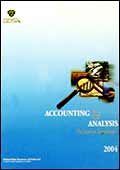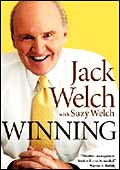|
|
|
Jack Welch: The three
strikes and you're out manager
|
|
|
What
more can you say after you've apparently said everything that's
there to be said? When every word you've spoken over the last
two decades has been recorded and analysed and accepted as the
epitome of management wisdom? And when you've already published
a best-selling autobiography barely three years ago? If you're
Jack Welch, you write another book on a subject that's dear to
everyone's heart-winning.
It's a book-co-written by his new wife Suzy,
a former Editor of Harvard Business Review-that Welch is particularly
well qualified to pen. Since retiring from GE in 2001, Welch has
met thousands of people all over the world-on roadshows to promote
his autobiography to begin with and then on the global lecture
circuit. At every meeting he's been peppered with questions on
his management style, on how to meet the competition and on how
to get ahead in one's career. These questions, he says, made him
think... And from those thoughts flows this book... Its stated
goal: to help people with ambition in their eyes and passion running
through their veins, wherever they are in the organisation.
Full of anecdotal examples drawn from Welch's personal
experience, Winning has five sections. The first, titled "Underneath
It All", lays out the author's basic management philosophy. In
it Welch stresses the need for companies to have strong mission
statements and value systems to achieve given goals on a template
of airtight integrity. The idea, he says candidly, is not to have
a noble statement of intent to hang in the company lobby, but
to have a roadmap on "How do we intend to win in this business?"
And most of all, he stresses the absolute necessity of candour,
which he says, is "the biggest dirty little secret in business".
|
|
WINNING
By Jack Welch with Suzy Welch
Harper-Collins
PP: 372
Price: Rs 1,092
|
The second section, "Your Company", offers practical
tips on leadership, hiring, firing and change and crisis management.
"Success," he writes, "is all about growing others."
He talks passionately of people management and makes a forceful
case for giving the hr function as much importance as finance.
"If you managed a baseball team, would you listen more closely
to the team accountant or the director of player personnel?"
he asks provocatively. The answer to that question could determine
whether your company has what it takes to become another GE!
The next section, "Your Competition"
is full of Welch's trademark iconoclasm. Budgeting, he says, is
not, or at least should not be, about living within your means.
Instead, it should have more to do with beating last year's numbers.
He even explains Six Sigma-that baffling statistical tool that
helps GE churn out everything from zero-defect jet engines to
high quality managers-in comprehensible seven pages, and no...
it doesn't feel like a root canal surgery without anaesthesia.
But the section readers will probably identify
with most is the one on "Your Career". In it, Welch
discusses how to find the right job-not necessarily your first-at
any point of your career, the mechanics of growing within a job
and of dealing with superiors, peers and subordinates. He devotes
a full chapter to something we've all had to endure at some point
or the other: a bad boss. "The world has jerks. Some of them
get to be bosses," he writes charmingly, and proceeds to
lay out general principles on how they should be dealt with.
The final section, "Tying Up Loose Ends"
deals with themes the previous four sections don't cover. They
deal with the China question (Will it gobble all of us?), how
his successor Jeff Immelt is doing (great), the state of his golf
game (he gave up the game due to a bad back) and, the most bizarre
one of them all: does he think he'll go to heaven? He'd rather
not find out anytime soon.
All in all, an engaging, free flowing book
that every executive should read.
-Arnab
Mitra
 |
THE TRAVELS OF A T-SHIRT...
By Pietra Rivoli
John Wiley & Sons
PP: 254
Price: Rs 1,320 |
Usually, books
on globalisation come in two varieties. One is the sort written
by the free marketer, whose forehead-slapping "don't-you-see"
argument is essentially an admonishment of those who refuse to
acknowledge the benefits that globalisation has brought economies
around the world. The other is the rant of the protectionist,
who can only see Chinese imports (yes, China is still the happy
culprit) shuttering one factory after another in his town, and
not the larger benefits to his country's economy.
Rivoli's book, by that argument, is unusual.
Although an economist and professor of international business
at Georgetown University's McDonough School of Business, Rivoli
doesn't approach the subject like an economist. Instead, she brings
the business journalist's curiosity to a phenomenon that has generated
so much heat in so little time. Watching students protest against
globalisation on her Washington dc campus one February morning
in 1999, Rivoli sets off on a journey to trace the tortuous path
of global trade, using only a T-shirt as her metaphor. The result
is a delightful, yet largely dispassionate, "travelogue"
on globalisation. Instead of getting caught up in complex trade
pacts and laws, Rivoli spotlights what ought to matter the most:
people, especially those caught in the crossfire of globalisation.
A cotton-farming couple in the US to a factory supervisor in China,
to the cast-off T-shirt agents in Africa, all populate her book.
While simplifying world trade down to the life of a cotton T-shirt
has its perils, one does wish more economists would write like
Rivoli. If they did, there'd be greater popular understanding
of key economic issues and less of misguided activism.
-R. Sridharan
 |
ACCOUNTING & ANALYSIS
By GDSIL Team
GDSIL
PP: 325
Price: Rs 500 |
The second edition
of this book by CRISIL-subsidiary GDSIL, Accounting & Analysis:
The Indian Experience, is targeted at students. The first chapter
details the nitty-gritty of company accounts with the help of
household income and expenses. It also shows how to prepare a
profit and loss (P&L) account and a balance sheet for the
household. Beyond that, it explains the sad trends of the recent
past (based on an analysis of the last two financial years: 2002-03
and 2003-04). These include India Inc.'s write-off of substantial
expenses directly from the reserves (actually some companies even
write back these direct write-offs through the P&L accounts
and thereby increase profit), the end of the practice of appending
the accounts of subsidiaries (some companies publish them separately,
or get permission for exclusion from the Department of Company
Affairs), and the end of transparency on matters of critical operational
detail such as production, sales and closing stocks (MIS-evaluations
of which are a common problem). So the book is also useful to
professionals. It cites specific companies that understate liabilities,
overstate assets or cook their books in other familiar and not-so-familiar
ways. There is also an index of companies for quick reference.
That should please analysts.
-Narendra Nathan
|







